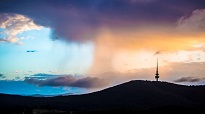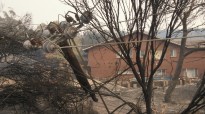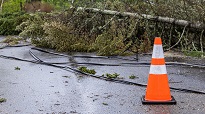Storms, high winds, floods, and bushfires can damage our network and put you in danger.
- Prepare for a possible power outage
- Follow us on Facebook and Twitter for any large outage updates
- Visit the ACT Emergency Services Agency for emergency updates
The priority of our crews is to restore power to you safely and quickly; however, it can take time after extreme weather events to assess damage and safely access energy infrastructure.
For electricity faults and emergencies call 13 10 93, for gas faults and emergencies call 13 19 09.
Storm safety
During a storm, high winds, lightning, rain, and hailstones can damage electricity and gas equipment which may result in blackouts.
Fallen, low-hanging or damaged powerlines are dangerous and should always be treated as live. Stay at least 10 metres away and call us immediately.
Before
- Keep trees on your property clear from powerlines.
- Secure loose items in yards and verandas that could become airborne in high winds.
- Unplug electronic equipment that may be affected by a power surge.
- Cover your fuse box or main switch to prevent water damage.
During
- Stay at least 10 metres away from fallen or low powerlines and objects touching them.
- Seek shelter in a safe place, away from windows.
- Listen to your local ABC radio station for updates and warnings.
- Avoid using landline telephones and never use electrical appliances that are damaged or wet.
- For safety, your solar system will automatically switch off when the electricity supply is interrupted. If your solar system becomes wet or submerged, treat it as a serious electrical hazard. Remember, even if your mains power supply is disconnected, your PV panels will continue producing electricity during daylight hours.
After
- Check your property and home for damage. Stay clear of damaged energy equipment and report it to us immediately.
- Don’t try to connect your solar system if your roof has been damaged. .Contact your installer or a licensed electrical contractor.
Bushfire safety
In the ACT, the bushfire season typically begins in spring and runs through the summer months.
We regularly inspect powerlines to maintain fire safety clearances, and power supply reliability.
Before
- Turn off the main power switch in your electricity meter box and/or switch off your gas supply with the valve on your gas meter, if safe to do so.
- Keep trees on your property clear from powerlines.
- If you see vegetation that is overhanging powerlines in parks and reserves that have a high fire danger, complete the Vegetation reporting form.
- Remove combustible material from around your home, and regularly clean your gutters and roof.
During
- If the fire is near powerlines, stay at least 25 metres from them. Smoke can act as a conductor, and a fire burning on or near powerlines can increase the chances of electrical explosion.
- For safety, your solar system will automatically switch off when the electricity supply is interrupted.
After
- Do not turn on the gas supply until a technician has tested it – they will need to check for leaks before it can be turned back on.
- Beware of trees that could fall, and if you see fallen power poles or powerlines stay at least 10 metres away and call us immediately.
- If your property has been damaged by fire, a qualified electrician should check your home and appliances before Evoenergy is contacted to restore power.
Flood safety
While floods are not common in the ACT, it is important you know how to stay safe to avoid electric shocks or electrocution.
Floods generate debris that can damage the electrical wiring on your property, so it is not only important to keep safe when the water rises, but it is also essential to take the appropriate actions once the water decreases.
Before
- Unplug and turn off electrical devices and raise them above expected flood levels.
- Turn off the main power switch in your electricity meter box and/or switch off your gas supply with the valve on your gas meter, if safe to do so.
During
- Do not stay in a flooded building that has power connected.
- If you feel a shock or tingling sensation from taps, baths, or sinks – avoid using them and report it to us.
- If electrical infrastructure is in contact with flood water, keep at least 150 metres away and call us immediately.
- For safety, your solar system will automatically switch off when the electricity supply is interrupted. If your solar system becomes wet or submerged, treat it as a serious electrical hazard. Remember, even if your mains power supply is disconnected, your PV panels will continue producing electricity during daylight hours.
After
- Do not attempt to handle switches or electrical appliances if there is water damage and do not assume your power is disconnected.
- Wear shoes made from rubber if you need to walk in areas impacted by water.
- Get a qualified electrician to assess damage to electrical infrastructure on your property.
- Do not turn on the gas supply until a technician has tested it – they will need to check for leaks before it can be turned back on.
- Don’t try to switch your solar system on or off if it has been damaged by rain or floodwater. Contact your installer or a licensed electrical contractor.



